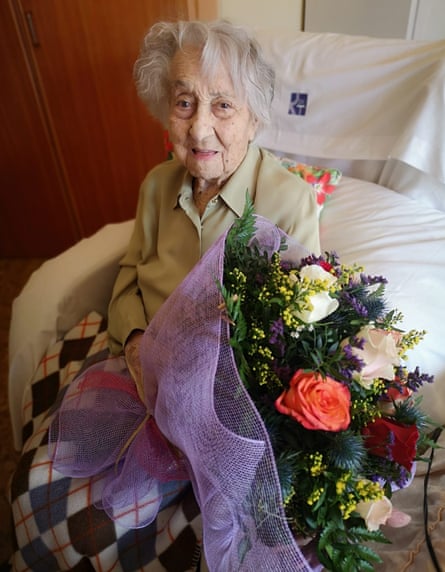Spaniard Maria Branyas has lived through earthquakes, war, pestilence and fire and, at 116, is still very much around. She is sound of mind, strong-hearted, mentally alert, and dispenses advice on X (formerly Twitter) on how to add those extra decades. “Order, tranquillity, good connection with family and friends, contact with nature, emotional stability, no worries, no regrets, lots of positivity and staying away from toxic people,” she writes. Natural yoghurt, genes and luck have also helped.
Branyas has agreed to become part of geneticist Dr Manel Esteller’s investigation into why, while chronologically a supercentenarian, her biological age is so much lower. Ninety may not yet be the new 50, but those aged 100 or more are on the increase, many of them defying notions of decay and frailty.
Jeanne Calment, who died in Arles, France in 1997 aged 122, having moved into a nursing home only five years earlier, advocated a daily dose of port, chocolate and a cigarette. Humour was in her lifeblood. “I’ve never had but one wrinkle,” she told an interviewer. “And I’m sitting on it.”

According to estimates by the UN in 1995, there were 95,000 centenarians globally. By 2100, it predicted there would be a “silver tsunami” of more than 20 million.
Extending the human lifespan appears to be the current obsession of billionaires, who sacrifice their middle age to ice baths, spartan diets, vitamins and exercise marathons in the hope that, like jellyfish, hydra and deep sea worms, they can shed senescent cells and rejuvenate, be immortal Peter Pans. But is a perpetual battle to cancel death a life worth living?
What’s interesting about Calment and Branyas is that they achieved healthy longevity without this self-punishment. Of course, the work of scientists trying to genetically reverse the degenerative aspects of ageing is important but so, too, is the issue of how we might learn to live a good life before it’s too late.
Not very long ago, people were born, worked, retired and died even before they had time to take the retirement gift out of the box. But what now, when there are five or more decades after the traditional cut-off point for paid work? What gives you joy? How do you pay for it? How do we act our age once family are dead, friends are departed, ambition is discarded and income is likely to be limited, living in a largely female post-centenarian world in a threadbare welfare state?
READ RELATED: Should I worry about blue light?
It’s not all bleak. In her witty and wise book Out of Time, writer Lynne Segal quotes poet May Sarton: “Old age can be magnificent … I am surer about what my life is about, have less self doubt to conquer.”
Perhaps it’s only in “early old age” – 70? 80? – that the pieces fall into place, finally beginning to make sense of how you reached this point, for better or for worse.
Traditionally, women are valued for their youth and reproductive capability – as more pass 100, will respect be given to traits other than looks and ovaries? Will the long-distance woman with a lifetime of experiences and sagacity begin to count again?
Poverty, lack of education and poor investment in public health and the vital social infrastructure of clubs, activities and care all cull people prematurely. But one of the longest studies of male human development, begun in 1938, brings reason for hope for those who might still, nonetheless, have decades ahead. Close relationships, more than fame, success, social class, IQ, genes and income, were better predictors of long and happy lives.
The passport to healthy longevity, according to the study, is to steer clear of booze and tobacco, exercise optimism and empathy, delay gratification, seek out the funny side of life, keep learning – as Branyas, the world’s longest living woman, advises. Most of us know the formula: the catch comes in applying it when next month’s bills are the most pressing concern.
Time is gold and, paradoxically, time is on the side of the very old, because they have so much more of it, freed from employment, child-rearing, care-giving, juggling. Male and female, they perhaps appreciate when so much closer to death what to really value in life.




